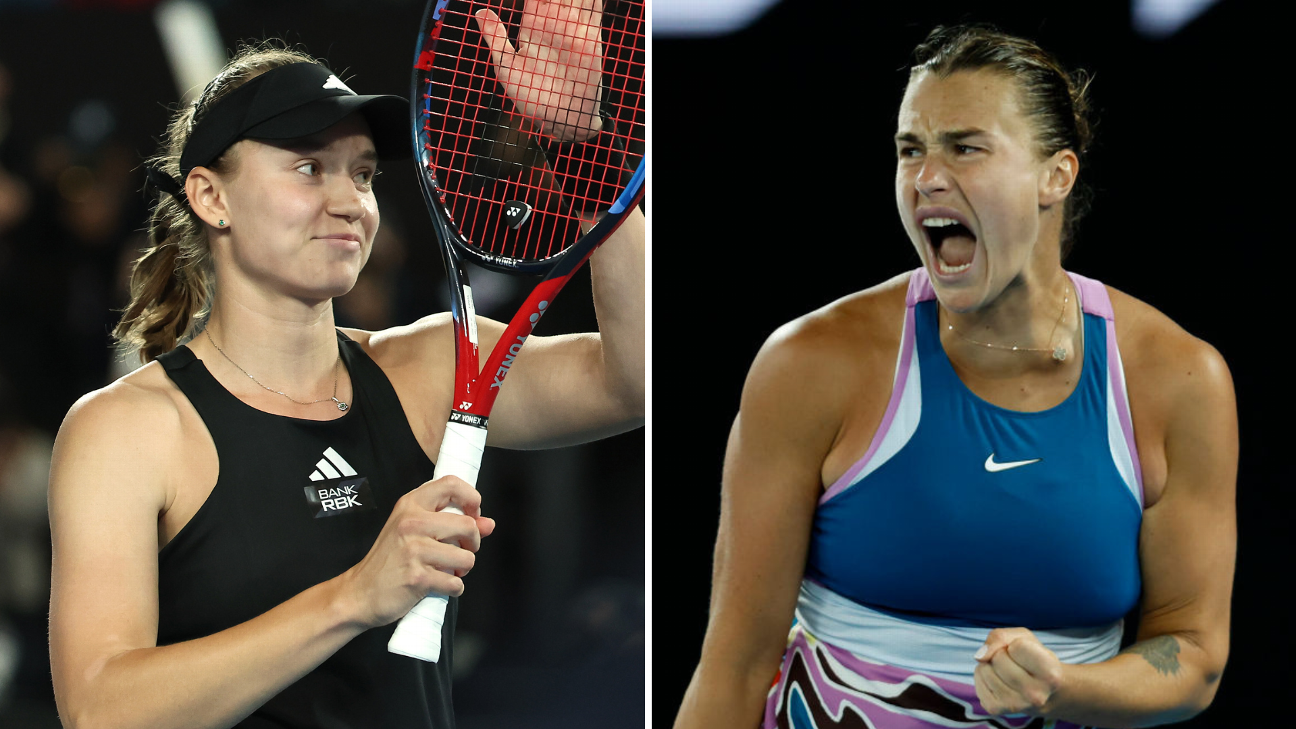MELBOURNE, Australia — A first-time Australian Open champion will lift the Daphne Akhurst Memorial Cup on Saturday, regardless of whether it’s Elena Rybakina or Aryna Sabalenka.
It’s Rybakina’s second final appearance in the past three Slams, and she’s 6-0 in major matches against seeded opponents since the start of Wimbledon 2022. She was 1-5 in the same scenario prior to the 2022 championships at Wimbledon.
As for Sabalenka, her start to 2023 has been almost flawless: 10 matches played, 10 matches won, 20 sets won. She’s in ominous form and is so close to a first Grand Slam title.
The No. 5 seed Sabalenka holds a 3-0 win-loss record over Rybakina, but all three clashes have gone the distance to three sets. They also haven’t faced each other since Rybakina’s breakthrough win at Wimbledon.
What can we expect? A lot of firepower — big serves, fast groundstrokes and a lot of aces.
Why Elena Rybakina will win
Her massive serve and power hitting are the two weapons that can help Rybakina lift a second Grand Slam trophy.
Not only has she recorded the fastest women’s serve at the tournament at 195 km/h (121.2 mph), but her first serves are often so well placed that her opponents just can’t get a return into play. She has hit the most aces of any woman at the tournament (a stat admittedly skewed given she has played the most matches), but her unreturned first-serve percentage sits at 53% going into Saturday’s final — a full 7% higher than the next best player.
Put simply, if Rybakina serves well, she rarely loses a point. She has won 80% of all points on her first serve, which is also the highest of any woman at the Australian Open (tied with Qinwen Zheng, who was beaten in the second round).
It is an “if,” however. Across the entire tournament, the women’s average for first serves in play is 64%, but Rybakina sits tied for 113th out of 128 competitors with a first-serve percentage of 55%.
Rybakina has also enjoyed favorable conditions through the early parts of the tournament. She lamented her first-round match being scheduled on the outside courts, but it likely worked in her favor. They’re often faster than the stadiums, and playing during the day in warmer weather also equates to more ball speed across the courts.
After her semifinal win over Victoria Azarenka, she said she struggled to attack the ball as she normally would — perhaps a sign her game isn’t quite as well suited to the cooler conditions of Rod Laver Arena at night.
“I didn’t expect it’s going to be that big of a difference,” she said postmatch. “Yeah, it was much slower. The ball was heavier. It was difficult to move it.”
Why Aryna Sabalenka will win
The No. 5 seed will have to fight fire with fire, and she’ll take great pleasure in doing so.
A first-time Slam finalist, Sabalenka’s power game is one of the most formidable on the tour, and while Rybakina has a huge serve, the Belarusian’s isn’t far behind.
Sabalenka’s fastest serve of the tournament was 193 km/h (120 mph), and 42% of her first serves have been unreturned (tied for seventh at this tournament). She’s also tied for sixth in percentage of first-serve points won (75%).
She’ll be confident in being able to handle Rybakina’s weapons, too. Sabalenka has hit a tournament-high 28 return winners at this tournament — 10 more than Rybakina. She also punishes mistakes incredibly well, winning 63% of points on opponents’ second serves — a stat especially crucial given Rybakina’s first-serve percentage languishes at a meager 55%.
If she gets into a pickle in her own service games, Sabalenka is rated No. 1 at this tournament for break-point opportunities saved — denying her opponents 25 times from 31 chances (81%).
She’s tied for No. 1 in forehand winners as a percentage of all points won or lost (13%) — nearly double the average of the rest of the field. She also hits twice as many backhand winners (9%) as the rest of the tournament. This could be especially crucial as Rybakina has a tendency to approach the net at times with limited success. A few passing winners could set the tone and give her the confidence to go on with the match.
The question that lingers over Sabalenka remains her mental game. Prone to double faults (she served 428 in 2022), if she loses confidence, things can unravel quickly.
“I think that’s OK to feel little bit nervous,” she said in her pre-final news conference. “It’s a big tournament, big final. If you’re going to start trying to do something about that, it’s going to become bigger, you know? I’ll just leave it like that. It’s OK to feel nervous.”
What will happen?
It will be power vs. power in this women’s final. Both players have exceptional skills that are good enough to win them this match and the Slam, but Sabalenka’s form in 2023 (10 straight sets wins from 10 matches) is irresistible. She has the edge here, but in three hard-fought sets.
